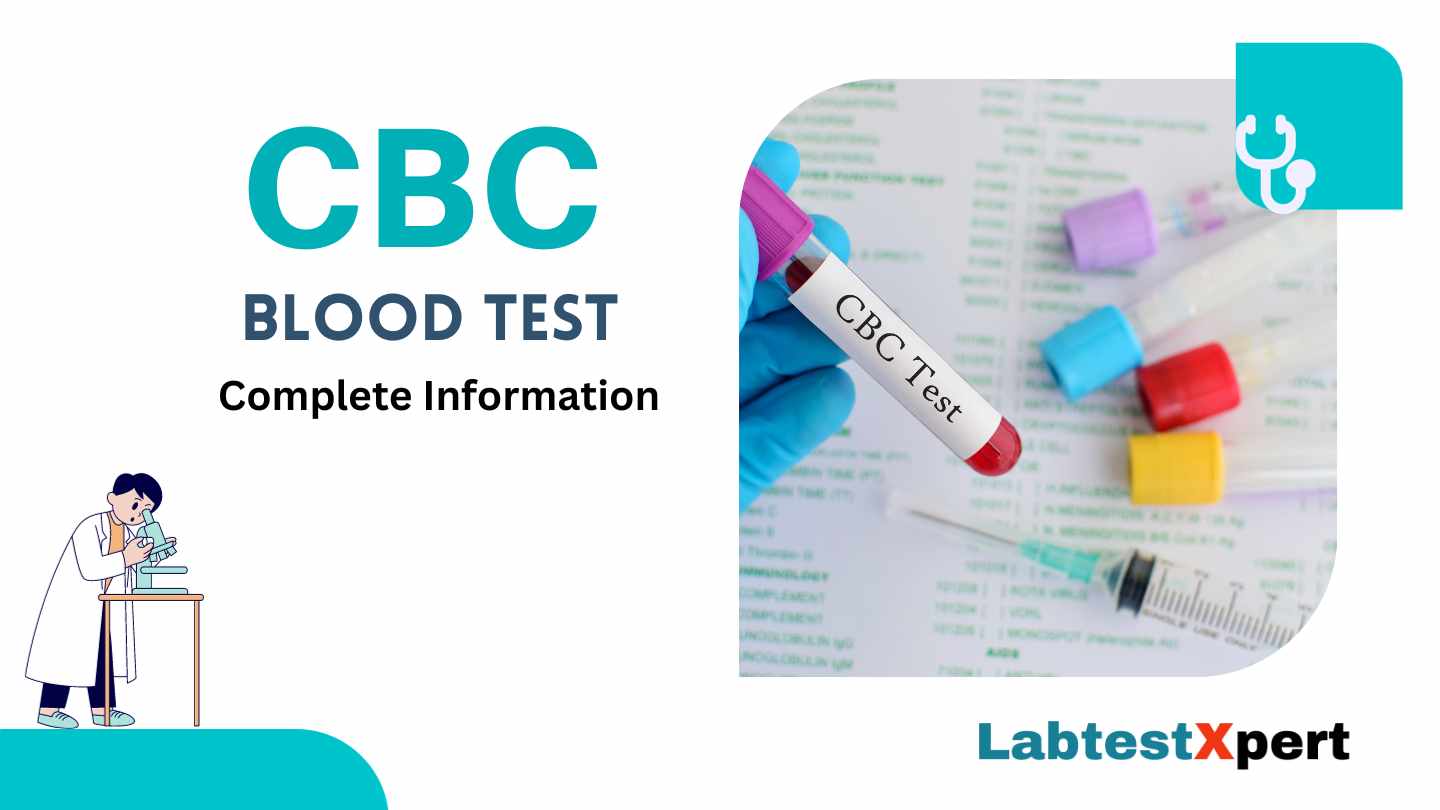A CBC blood test, or Complete Blood Count, is a common blood test that provides important information about the quantity and quality of the different components of your blood. It is often used as a general screening test and can help diagnose a variety of medical conditions.
Understanding the CBC Blood Test (Haemogram test):
When it comes to understanding our overall health, one of the most valuable diagnostics tools is the CBC blood test. This unassuming test, which checks various components of our blood, holds the key to diagnosing and preventing a wide range of health conditions.
The Complete Blood Count, or CBC blood test , is a standard blood test that provides a snapshot of your blood’s composition. It assesses various components, including red blood cells (RBCs), white blood cells (WBCs), platelets, hemoglobin, and more. This test is the first step in assessing your overall health and can help identify potential health issues before they become serious.
In this comprehensive guide, we will delve into the world of the CBC blood test, explaining its significance, how to interpret the results, and how it plays a pivotal role in maintaining your well-being. Whether you’re in India or anywhere else, the knowledge shared here is essential for anyone conscious about their health.
Alternate name of CBC test?
The Complete Blood Count is commonly known by its abbreviation, “CBC” , which is widely used in healthcare sector. However, there are no widely recognized alternate names for the CBC blood test. It is primarily referred to as “CBC” in medical terminology and clinical practice.
In some cases, healthcare providers may informally refer to it as a
- Haemogram Blood test
- complete blood analysis
- Total blood Count
- Complete blood cell
- blood count
Sample Required for CBC blood tests?
A Complete Blood Count (CBC) blood test requires a sample of your blood to be collected for analysis.
- Type of Tube: Depending on the specific tests ordered (in addition to the CBC), CBC blood sample collected in EDTA sample tube. Multiple tubes may contain anticoagulants or additives to prevent clotting and preserve the integrity of the blood sample.
- Sample Volume: The amount of blood required for a CBC is relatively small, typically less than 10 millilitres (ml) or as per standard mark of blood volume on EDTA tube.
- Fasting: In most cases, you do not need to fast (refrain from eating or drinking) before a CBC blood test. It can be performed at any time of the day, and you can eat and drink as usual.
- Preparation: There is generally no specific preparation required for a CBC. However, it’s a good idea to inform your healthcare provider of any medications or supplements you are taking, as certain medications can affect the results.
CBC blood test price or Charges
The cost of a Complete Blood Count (CBC) test in India can vary by region, healthcare facility, and the specific type of facility where the test is conducted. Here’s an approximate cost range for a CBC test in India . so it’s essential to verify the current cost with local healthcare providers or laboratories:
| State (City Name) | Approximate Price range for a CBC test in India |
| Delhi/NCR Region | ₹150 – ₹500 or more |
| Mumbai, Maharashtra | ₹200 – ₹600 or more |
| Chennai, Tamil Nadu | ₹150 – ₹450 or more, |
| Kolkata, West Bengal | ₹100 – ₹400 or higher |
| Bangalore, Karnataka | ₹150 – ₹500 or more |
| Hyderabad, Telangana | ₹150 – ₹500 or more |
| Pune, Maharashtra | ₹150 – ₹500 or more |
It’s important to note that the cost can differ not only by state but also within cities and regions. Various factors, such as the type of healthcare facility (government hospital, private clinic, diagnostic centre), It’s advisable to check with local healthcare providers or laboratories to obtain the most accurate and up-to-date pricing information for CBC tests in your specific area.
The cost of a Complete Blood Count (CBC) blood test can vary significantly depending on various factors, including:
- Location: The cost of medical tests can vary by region and healthcare facility. Tests are often more expensive in urban areas compared to rural locations.
- Healthcare Provider: Different healthcare providers, such as hospitals, clinics, and private laboratories, may charge different prices for the same test.
- Health Insurance: If you have health insurance, your coverage may partially or fully cover the cost of the CBC, depending on your plan. The out-of-pocket expenses can vary based on your insurance policy.
What is the CBC Blood Test, and Why Is It Essential?
Let’s start with the basics. The CBC blood test is a simple yet invaluable tool that offers a snapshot of your blood’s composition. It’s a crucial part of any health assessment, and here’s why: it tells us about the very essence of your well-being—your blood.
Your blood is like a bustling city, with various inhabitants each playing a vital role. The CBC provides us with a detailed census of these inhabitants, allowing us to spot any irregularities or health concerns. Imagine it as a report card for your blood, with each component revealing crucial information about your overall health.
Parameters of a CBC blood test
A Complete Blood Count (CBC) blood test typically includes a panel of parameters that provide comprehensive information about the cellular components of your blood. The standard CBC panel includes the following parameters:

- Red Blood Cell (RBC) Parameters:
- Red Blood Cell Count (RBC): These cells carry oxygen from your lungs to the rest of your body and transport carbon dioxide back to the lungs for exhalation. The CBC measures the number and size of RBCs, which is important for assessing conditions like anemia.
- Hemoglobin (Hb): Hemoglobin is a protein inside RBCs that binds to oxygen. The CBC assesses your hemoglobin levels, which are essential for oxygen transport and can indicate conditions like anemia..
- Hematocrit (Hct): Hematocrit is the ratio of the volume of RBCs to the total volume of blood. It helps diagnose conditions like dehydration or polycythemia (an abnormal increase in RBCs).
- White Blood Cell (WBC) Parameters:
- White Blood Cell Count (WBC): WBCs are part of your immune system and help your body fight infections. An abnormal WBC count can indicate infection, inflammation, or other immune system disorders..
- Differential WBC Count: This includes subtypes of white blood cells, such as neutrophils, lymphocytes, monocytes, eosinophils, and basophils. Each subtype has a specific role in the immune response.
- Platelet Parameters:
- Platelet Count: Platelets are tiny cell fragments that play a crucial role in blood clotting. The CBC measures the number of platelets in your blood, which can help diagnose bleeding disorders or clotting problems.
- Red Blood Cell Indices:
- Mean Corpuscular Volume (MCV): MCV measures the average size of your RBCs. It can be useful in diagnosing different types of anemia .
- Mean Corpuscular Hemoglobin (MCH): MCH measures the average amount of hemoglobin in your RBCs and helps in diagnosing anemia.
- Mean Corpuscular Hemoglobin Concentration (MCHC): MCHC measures the concentration of hemoglobin in your RBCs and can provide further insights into anemia.
- Red Cell Distribution Width (RDW): RDW measures the variation in size of your RBCs. It can be helpful in diagnosing different types of anemia.
Symptoms of CBC test
A Complete Blood Count (CBC) may be recommended if you have symptoms that could be indicative of various medical conditions. While a CBC alone cannot diagnose a specific condition, abnormal CBC results may suggest the need for further tests or investigations. Some symptoms that may prompt a healthcare provider to order a CBC include:
- Fatigue: Unexplained and persistent fatigue or weakness that does not improve with rest.
- Pallor: Paleness of the skin, mucous membranes, or conjunctiva (the white part of the eyes).
- Shortness of Breath: Especially if it’s not due to physical exertion or known respiratory conditions.
- Dizziness or Lightheadedness: Particularly if it occurs frequently or upon standing.
- Frequent Infections: If you have a history of recurring or severe infections, a CBC may help assess your immune system’s function.
- Unexplained Fever: A CBC may be ordered if you have a fever without an apparent cause.
- Bruising or Bleeding: Excessive or unexplained bruising, bleeding from the nose or gums, or prolonged bleeding after minor injuries.
- Abdominal Pain: Especially if it is associated with other symptoms like fatigue or unexplained weight loss.
- Swollen Lymph Nodes: Enlarged lymph nodes, particularly if they are painless and persist.
- Joint Pain: If joint pain is unexplained and persistent.
- Weight Loss: Unintentional weight loss without dietary changes or increased physical activity.
- Chest Pain: If chest pain is not related to a known cardiac condition.
- Skin Changes: Such as petechiae (small red or purple dots on the skin), ecchymosis (larger bruises), or skin rashes.
- Frequent or Severe Headaches: Especially if accompanied by other concerning symptoms.
- Numbness or Tingling: In the extremities or other parts of the body.
- Vision Changes: Sudden or unexplained changes in vision.
It’s important to note that a CBC is a general screening test and may not provide a specific diagnosis. Abnormal results may prompt further investigations, such as additional blood tests, imaging studies, or consultations with specialists, to determine the underlying cause of the symptoms
Why do healthcare providers refer CBC blood test?
Healthcare providers order Complete Blood Counts (CBCs) for a variety of reasons to assess a person’s overall health and to aid in the diagnosis and monitoring of various medical conditions. Here are some common reasons why healthcare providers order CBCs:
- Routine Health Check-ups: CBCs are often included as part of routine health check-ups to establish a baseline of a person’s blood parameters. Regular check-ups can help detect subtle changes over time.
- Assessment of General Health: Healthcare providers may order a CBC when assessing a person’s general health, especially if the individual has symptoms like fatigue, weakness, or unexplained weight loss.
- Diagnosis of Medical Conditions: CBCs are valuable in diagnosing a wide range of medical conditions, including:
- Anemia: Low levels of red blood cells or hemoglobin.
- Infections: Elevated white blood cell counts can indicate an ongoing infection.
- Blood Disorders: Certain blood disorders, such as leukemia or clotting disorders, may show abnormalities in CBC results.
- Inflammatory Conditions: Elevated white blood cell counts may suggest inflammation.
- Hematological Disorders: Conditions affecting blood cells and bone marrow.
- Monitoring Medical Conditions: For individuals with known medical conditions that affect the blood, such as leukemia, myelodysplastic syndromes, or clotting disorders, regular CBCs are performed to monitor the progression of the condition and the effects of treatment.
- Before and After Surgery: CBCs are frequently conducted before surgical procedures to ensure the patient is in good health and can handle the stress of surgery. They may also be performed after surgery to monitor for complications such as bleeding or infection.
- Evaluation of Medications: Certain medications, such as chemotherapy drugs, can affect blood cell counts. Healthcare providers may order CBCs to monitor how these medications are impacting the patient’s blood cells.
- Evaluation of Symptoms: If a patient presents with specific symptoms like unexplained fatigue, dizziness, shortness of breath, or frequent infections, a CBC may be ordered to investigate potential underlying causes.
- Blood Donation and Transfusion: Blood banks and donation centers often perform CBC tests on blood donors to ensure the donated blood is healthy and safe for transfusion.
- Management of Chronic Illness: For individuals with chronic illnesses like autoimmune disorders or kidney disease, CBCs are part of ongoing assessments to monitor changes in blood cell counts that may indicate disease progression or treatment effectiveness.
- Assessment of Immune Function: CBCs can help assess the function of the immune system, particularly the white blood cells, which are essential for fighting infections.
Overall, CBCs are versatile and essential tests that provide valuable information about an individual’s health and can aid healthcare providers in making diagnoses, monitoring conditions, and ensuring patient safety during medical procedures.
CBC Blood test Normal Ranges/ Values
Certainly, here’s a chart showing normal reference ranges for different CBC parameters for newborns, children, males, and females with reference to biological reference ranges from India:
| Parameter | Normal Results for Newborn | Normal Results for Child | Normal Results for Male | Normal Results for Female |
| Hemoglobin (Hb) | 17.5 – 22 g/dL | 11.5 – 15.5 g/dL | 13.5 – 17.5 g/dL | 11.5 – 15.5 g/dL |
| Neutrophil | 20 – 40% | 30 – 60 % | 40 – 74 % | 40 – 74% |
| Lymphocytes | 40 – 60% | 25 – 55 % | 20 – 45 % | 20 – 45% |
| Eosinophil | 0 – 6% | 0 – 7 % | 0 – 7 % | 0 – 7% |
| Monocytes | 3 – 10% | 2 – 7 % | 2 – 10 % | 2 – 10% |
| Basophil | 0 – 2% | 0 – 2 % | 0 – 2 % | 0 – 2% |
| Total WBC Count | 9,000 – 30,000 cells/mcL | 5,000 – 13,000 cells/mcL | 4,000 – 11,000 cells/mcL | 4,000 – 11,000 cells/mcL |
| Hematocrit (Hct) | 49 – 64% | 33 – 43 % | 38 – 52% | 35 – 47% |
| R.B.C. Count | 6 – 7.5 million cells/mcL | 4.0 – 5.2 million cells/mcL | 4.5 – 6.0 million cells/mcL | 3.9 – 5.5 million cells/mcL |
| MCV (Mean Corpuscular Volume) | 100 – 135 femtoliters (fL) | 75 – 87 femtoliters (fL) | 80 – 100 femtoliters (fL) | 80 – 100 femtoliters (fL) |
| MCH (Mean Corpuscular Hemoglobin) | 31 – 37 picograms (pg) | 23 – 31 picograms (pg) | 26 – 34 picograms (pg) | 26 – 34 picograms (pg) |
| MCHC (Mean Corpuscular Hemoglobin Concentration) | 32 – 36 g/dL | 31 – 37 g/dL | 31 – 37 g/dL | 31 – 37 g/dL |
| RDW – CV | 11.6 – 14.6% | 11.6 – 14.6% | 11.6 – 14.6% | 11.6 – 14.6% |
| RDW – SD | 38.3 – 47.6 fL | 38.3 – 47.6 fL | 38.3 – 47.6 fL | 38.3 – 47.6 fL |
| Platelet Count | 200,000 – 600,000 cells/mcL | 150,000 – 450,000 cells/mcL | 150,000 – 450,000 cells/mcL | 150,000 – 450,000 cells/mcL |
Please note that these are approximate normal reference ranges based on biological reference ranges in India. The reference ranges for newborns, children, males, and females may vary slightly depending on the specific population, laboratory standards, and equipment used for testing. Always consult with a healthcare professional for an accurate interpretation of CBC results based on the patient’s age, sex, and individual health status
CBC blood test results mean :
Interpreting the results of a Complete Blood Count (CBC) requires a healthcare provider’s expertise, as they consider various factors, including the patient’s medical history, symptoms, and other test results. However, here’s a general overview of what certain CBC results can indicate:
- Red Blood Cells (RBCs):
- Low RBC Count: This could indicate anemia, which may result from conditions such as iron deficiency, vitamin deficiency, chronic disease, or blood loss.
- High RBC Count: Elevated RBC counts may suggest conditions like polycythemia vera, a disorder characterized by an excess of RBCs.
- Hemoglobin (Hb):
- Low Hemoglobin: Low hemoglobin levels are a common indicator of anemia. The specific type of anemia can be determined based on additional tests and clinical evaluation.
- Hematocrit (Hct):
- Low Hematocrit: Low hematocrit levels may also indicate anemia, blood loss, or nutritional deficiencies.
- High Hematocrit: Elevated hematocrit can be seen in conditions like polycythemia vera or dehydration.
- White Blood Cells (WBCs):
- Low WBC Count: A decreased WBC count (leukopenia) can be associated with conditions that suppress the immune system, such as viral infections or certain medications.
- High WBC Count: An elevated WBC count (leukocytosis) may suggest an infection, inflammation, leukemia, or other disorders affecting white blood cells.
- Platelets:
- Low Platelet Count: A low platelet count (thrombocytopenia) can increase the risk of bleeding and may be seen in conditions like immune thrombocytopenia or bone marrow disorders.
- High Platelet Count: Elevated platelet counts (thrombocytosis) may be associated with conditions like reactive thrombocytosis, essential thrombocythemia, or inflammatory disorders.
- Mean Corpuscular Volume (MCV):
- Low MCV: A low MCV indicates microcytic anemia, which is often associated with iron-deficiency anemia or certain other types of anemia.
- High MCV: A high MCV suggests macrocytic anemia, which can result from conditions like vitamin B12 deficiency or folate deficiency.
- Mean Corpuscular Hemoglobin (MCH):
- Low MCH: Low MCH levels can be seen in microcytic anemias, similar to low MCV.
- High MCH: High MCH levels are seen in macrocytic anemias, similar to high MCV.
- Mean Corpuscular Hemoglobin Concentration (MCHC):
- Low MCHC: Low MCHC levels may indicate hypochromic anemia, where the hemoglobin in the RBCs is insufficiently concentrated.
- Red Cell Distribution Width (RDW):
- High RDW: A high RDW suggests variability in the size of RBCs, which can be seen in various types of anemia.
Interpreting CBC results is a complex process that requires considering multiple factors and may involve additional tests and clinical evaluation. It’s essential to consult with a healthcare provider to understand your specific CBC results and their significance in the context of your health.
What does a CBC in detecting and diagnosing
A Complete Blood Count (CBC) is a common blood test that plays a crucial role in detecting and diagnosing various health conditions. It provides valuable information about the cellular components of the blood, allowing healthcare providers to assess a patient’s overall health. Here’s how a CBC assists in detecting and diagnosing health conditions:
- Anemia: A CBC helps diagnose anemia, a condition characterized by a deficiency of red blood cells (RBCs) or hemoglobin. By measuring hemoglobin levels and RBC counts, a CBC can identify different types of anemia and its underlying causes, such as iron deficiency, vitamin deficiency, or chronic diseases.
- Infections: An elevated white blood cell (WBC) count in a CBC can indicate the presence of an infection or an inflammatory condition. An increased WBC count suggests that the body is responding to an infection by producing more white blood cells to fight it.
- Bleeding Disorders: Abnormal platelet counts or platelet function can suggest bleeding disorders, such as thrombocytopenia (low platelet count) or thrombocytosis (high platelet count). These conditions can lead to easy bruising and excessive bleeding.
- Leukemia and Blood Cancers: CBC results can reveal abnormal levels and types of white blood cells, which may indicate the presence of leukemia or other blood cancers. These conditions often cause a significant deviation from the normal range for white blood cells.
- Inflammatory Conditions: Conditions like rheumatoid arthritis and lupus can be associated with specific CBC abnormalities, such as an elevated WBC count and increased levels of inflammatory markers.
- Dehydration and Overhydration: Changes in hematocrit (Hct) levels, which indicate the proportion of red blood cells in the blood, can help detect dehydration (elevated Hct) or overhydration (reduced Hct).
- Monitoring Chronic Diseases: A CBC is often used to monitor chronic diseases, such as diabetes or kidney disease. It helps healthcare providers track how these conditions affect blood cell counts over time.
- Blood Disorders: Abnormalities in the size, shape, or composition of red blood cells (e.g., in conditions like sickle cell anemia or thalassemia) can be identified through a CBC.
- Parasitic Infections: Elevated eosinophil counts may indicate the presence of parasitic infections.
- Autoimmune Diseases: Some autoimmune diseases, such as systemic lupus erythematosus (SLE), can affect blood cell counts, and a CBC can help in their diagnosis and monitoring.
- Medication Effects: Certain medications may affect blood cell counts, and a CBC can reveal any adverse reactions or side effects.
In summary, a CBC is a versatile diagnostic tool that provides critical information about various aspects of blood composition. It can help healthcare providers identify a wide range of health conditions, making it an invaluable test in both diagnostic and monitoring capacities.
Benefits of Haemogram test (CBC)
The Complete Blood Count (CBC) is a valuable and versatile blood test that offers several benefits in healthcare:
- Early Disease Detection: One of the primary benefits of a CBC is its ability to detect various medical conditions at an early stage, often before symptoms become apparent.
- Monitoring Health: For individuals with chronic medical conditions, such as anemia, blood disorders, or immune system disorders, regular CBCs provide a means to monitor the progression of the condition and the effectiveness of treatment.
- Diagnostic Tool: CBC results can provide crucial diagnostic clues for healthcare providers. Abnormalities in red blood cells (RBCs), white blood cells (WBCs), or platelets can help diagnose conditions such as anemia, infections, bleeding disorders, leukemia, and more.
- Assessment of Overall Health: Even in the absence of specific symptoms, a CBC can provide a snapshot of a person’s overall health. It assesses the components of the blood and may reveal underlying issues that need attention.
- Guiding Treatment: CBC results can influence treatment decisions. For example, in cancer patients undergoing chemotherapy, CBCs help determine the appropriate dosage and timing of treatments. In cases of anemia, the underlying cause can be addressed to improve blood cell production.
- Preventive Care: Regular CBC tests can be part of preventive healthcare. By detecting and addressing health issues early, individuals can take proactive steps to maintain good health and reduce the risk of complications.
- Screening for Blood Disorders: CBCs are used as screening tests for blood disorders such as sickle cell disease and thalassemia. Early identification of these conditions is crucial for appropriate management.
- Evaluation of Medication Effects: Certain medications, such as chemotherapy drugs, can impact blood cell counts. CBCs are used to monitor the effects of these medications on blood cells.
- Surgical Safety: Before surgery, a CBC is often performed to assess a patient’s overall health and ability to undergo the procedure safely. It helps identify any potential bleeding or clotting issues.
- Assessment of Dehydration: Changes in hematocrit (Hct) levels can indicate dehydration. Identifying dehydration is essential for appropriate fluid management.
- Personalized Healthcare: CBC results can provide insights into an individual’s unique health profile, allowing healthcare providers to tailor care and treatment plans accordingly.
- Health Monitoring: For individuals with certain health risk factors or conditions, regular CBC testing can serve as a monitoring tool to track changes in blood cell counts and overall health status over time.
Resources
For further research and detailed information about CBC blood tests, you can explore the following resources:
- Lab Tests Online: This website offers in-depth explanations of various laboratory tests, including the CBC. You can find detailed information about what each component measures and what abnormal results may indicate.
- Website: https://labtestsonline.org/
- MedlinePlus (National Library of Medicine): MedlinePlus provides consumer-friendly information about health conditions and medical tests, including CBC. It is a service of the U.S. National Library of Medicine.
- Website: https://medlineplus.gov/
- American Association for Clinical Chemistry (AACC): AACC offers educational resources and articles about laboratory tests, including CBC. They provide information for both healthcare professionals and the general public.
- Website: https://www.aacc.org/
Academic Journals:
- American Journal of Clinical Pathology: This journal often publishes research related to clinical laboratory medicine, including studies on CBC and its applications.
- Journal Link: https://academic.oup.com/ajcp
- Clinical Chemistry: Clinical Chemistry is a journal that covers various aspects of clinical laboratory testing, including the CBC.
- Journal Link: https://academic.oup.com/clinchem
- Laboratory Medicine: This journal focuses on laboratory testing in the field of clinical medicine, making it a relevant source for CBC-related research.
- Journal Link: https://academic.oup.com/labmed
- The International Journal of Laboratory Hematology: This journal specializes in research related to laboratory hematology, including the CBC and its clinical applications.
- Journal Link: https://onlinelibrary.wiley.com/journal/1751553x
- Hematology Reports: Hematology Reports publishes research articles and reviews related to various aspects of hematology, including blood tests like CBC.
- Journal Link: https://www.pagepress.org/journals/index.php/hr
Research Papers and Articles:
- “Complete Blood Count” by Ramanujam Srinivasan et al. (Journal of Clinical Oncology)
- “The Complete Blood Count and Beyond: An Illustrated Guide to Phlebotomy, Ordering, and Understanding Blood Tests” by Nicole M. Sheehan (Journal of Hospital Medicine)








